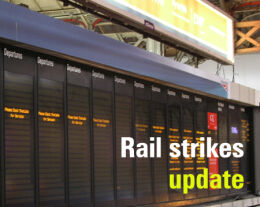Posted 29th August 2023 | 1 Comment
RMT seeks response this week to ‘road map’ proposals

The RMT union is hoping to hear from the Rail Delivery Group this week following a letter from the union’s general secretary Mick Lynch, in which he sets out a path to a negotiated settlement in the long-running dispute over pay and conditions, and which the union is describing as a ‘road map’.
The dispute, which began in the spring of 2022, is set to cause more disruption later this week, when 20,000 RMT members at train operators in England are being called out on 2 September, the second Saturday in succession, after walking out on 26 August.
Drivers belonging to ASLEF are striking on Friday 1 September, and will be refusing to work overtime the following day.
Train operators have been warning that most lines in England will be closed on Friday and that services will be ’limited’ on Saturday, where they run at all.
In his letter to the RDG, which was sent just before the Bank Holiday weekend, Mick Lynch wrote: ‘I believe that both parties are of the view that we need to navigate a way through the dispute and from the RMT’s position that would mean the following suggested stages: a 1-year pay proposal for all companies covering the year 2022-23, with an underpin, backdated to the relevant anniversary dates in 2022. A guarantee of no compulsory redundancies. An undertaking that discussions with RMT within the companies, including formal consultations and negotiations, will be deferred until the outcome and determination from the ticket office closures consultation has been provided by the Government and, in any case, that these discussions will not commence before 1 December 2023.
‘A commitment that in the interim, ahead of 1 December 2023, each Train Operating Company will provide to the RMT in writing, their full agenda, and details of “Workforce Reform” proposals for all functions and grades that they are seeking to apply within their organisations. A commitment that the existing collective bargaining structures and processes in each company will be respected and adhered to in full including consultation and negotiation as appropriate to the matters in scope and, if necessary, use of Avoidance of Dispute processes. A commitment that pay negotiations for the year 2023–2024 will commence from 1st December 2023.’
He continues: ‘In using the above staged programme, I believe that we can bring clarity to everyone in the industry, that they will receive a pay increment for the previous year 2022-23, with a guarantee of employment going forward, and that all of the change agenda that the companies wish to propose will be known in full and then addressed appropriately through the respective machineries in each of the companies.
‘I am aware of your initial view of the suggested programme, but I do request that full consideration is given by the RDG and DfT to this suggested means and that you respond to this initiative next week.’
The Rail Delivery Group has yet to publish its response.
Reader Comments:
Views expressed in submitted comments are that of the author, and not necessarily shared by Railnews.

Hugo, Newbury
Is anyone in government actually listening to these guys or just ignoring them. Maybe with a step change in people using the railways, a lot of change needs to happen first for example CHEAPER Fares to incoursge more people to modal shift to rail, cheaper travel to work, more railway lines reopened where traffic is high on roads, and a lot more trams are needed in towns and cities to encourage modal shift. Until this happens then I am guessing more strikes? Government needs to change the car charging issues, like pay for motorways as in Europe , fuel for cars should be raised every year inline with inflation to pay for a electrification of the whole of the UK rail network.